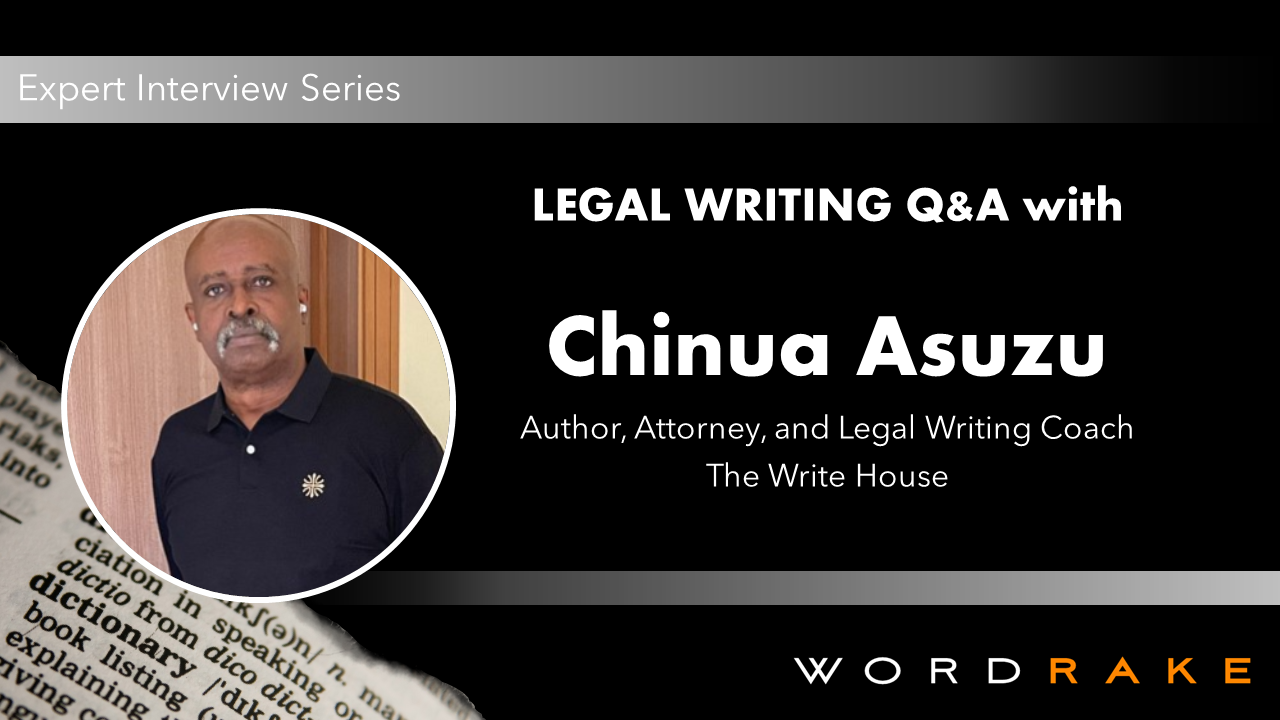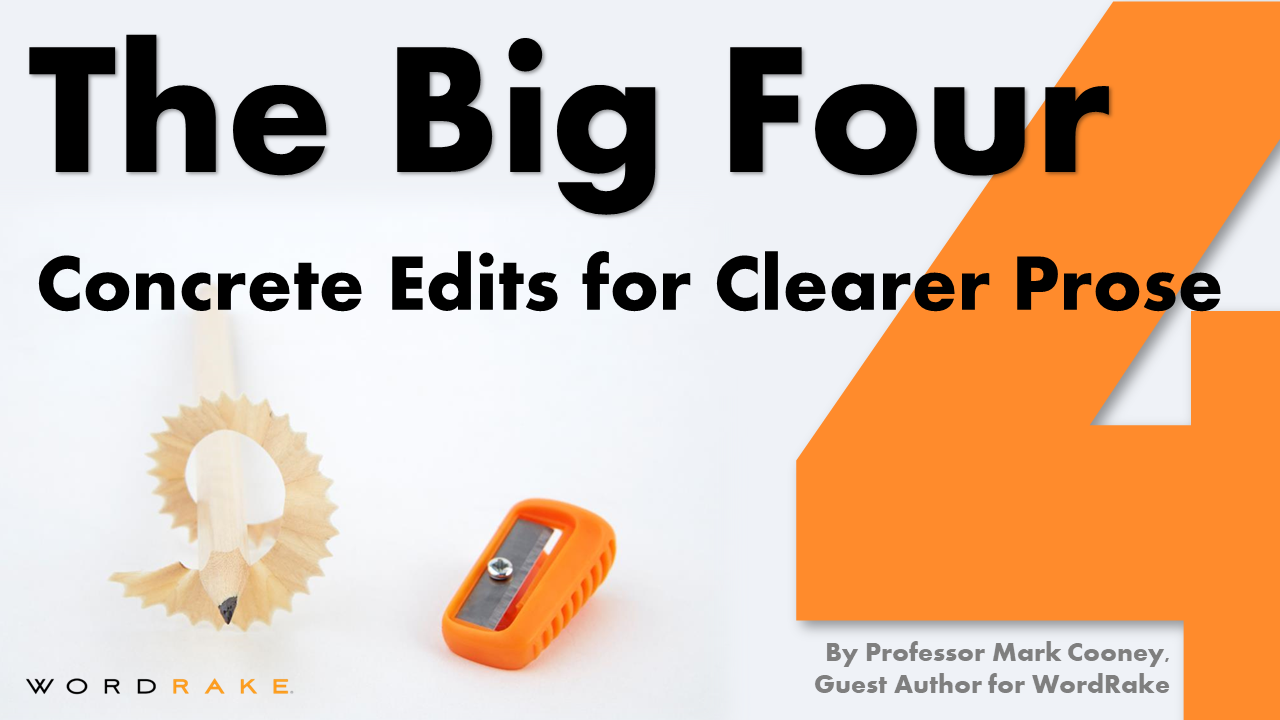What makes good legal writing? Clarity and simplicity! Attorney and legal writing coach Chinua Asuzu practices what he teaches. Even in this legal writing interview, he uses visual clues like lists and bullet points to make his meaning easy to read and understand. He shares his best practices with us.
What is your role and how did you get to where you are today?
Soon after I began practicing law in Nigeria, I observed that legal writing featured too much circumlocution, legalese, and verbosity. I didn’t think that was necessary or desirable to keep clients enthralled and the laity impressed, as most lawyers believe. If there was ever an era when legalese and verbosity served lawyers, that era is gone.
I also observed loads of bad grammar and poor syntax in lawyers’ writing. I thought I could squeeze out time to do something about both problems: write a short book or give a series of lectures. I didn’t get around to taking any action until about 13 years ago when I set up The Write House to teach legal writing. I have also published a few books on legal writing. Here they are: Chinua Asuzu.
How do you define good legal writing?
Good legal writing is direct, sincere, and unpretentious. It hews to the Standard Written English used by educated readers and writers. It encourages and enables the reader to take the action required or desired by the communication. It’s thus immediately comprehensible. It gets to the point from the first line. Its civilization, courtesy, and politeness are in the tone, not in words of collegiality, goodwill, or salutation. It’s simple but not simplistic. It doesn’t read like lawyers’ writing.
Good legal writing should
-
tell readers what they want to know and little more
-
be easy to read and understand
-
not be obscure
-
be concise
-
be pertinent
-
be logical and coherent
What are the top 3 to 6 characteristics of good legal writing?
-
Focus: Good legal writing focuses on the reader’s needs, giving just enough information for the context and occasion.
-
Clarity: Good legal writing uses plain language and avoids unnecessary complexity to ensure the reader understands the message.
-
Conciseness: Good legal writing is efficient (in the sense of verbally economical).
-
Precision: Good legal writing is precise except when strategy dictates a different approach.
-
Organization: Good legal writing is structured logically and coherently, with an arrangement that is discernible to the reader.
-
Persuasiveness: Good legal writing recruits the reader’s empathy to the writer’s points.
Why is good writing important to being a good lawyer?
Law is complex enough. The issues that feature in legal writing are complex and difficult. A good lawyer doesn’t add an extra layer of difficulty for their readers to wrestle with by using unnecessarily convoluted language. The mark of a true professional is the ability to convey complex ideas in simple language.
Good writing directly influences a lawyer’s ability to communicate effectively and efficiently. Clear and precise writing ensures that legal documents, including court documents, contracts, and statutes are understandable. A well-written brief or motion can be the difference between winning and losing a case, as it helps to present complex legal concepts in a way that is accessible and persuasive.
Good writing boosts a lawyer’s credibility and ethical reputation.
What is the biggest misconception the public has about legal writing?
The public believes, erroneously, that lawyers’ esoteric writing is inevitable. The public thinks lawyers have to write “like lawyers,” in other words, with legalese and verbosity. The biggest misconception the public has about legal writing, at any rate in Nigeria, is that it is inevitably complex, convoluted, and inaccessible. But many suspect that some lawyers deliberately use jargon and legalese to confuse and intimidate others, or to make their work seem more impressive.
What is the biggest mistake you see lawyers make when communicating with clients?
The biggest mistake lawyers make when communicating with clients is using legal jargon riddled with indirect syntax. In Nigeria, many lawyers deliberately show off legalese to the laity! This distances the paying clientele from the professional engaged to do a job, an unfortunate development, and a rainmaking deficiency. The communication gap is buttressed by a trust deficit, as clients feel overwhelmed or even victimized.
What is the most frustrating part about becoming a good legal writer? How do you overcome it?
The most frustrating part about becoming a good legal writer is the sheer amount of continuing legal education needed to remain in the top 5% of good legal writers. Great articles, blogs, books, and other materials abound, each with fresh nuance for the already-good legal writer, who must try to keep up. Law Prose and WordRake are part of the “problem.”
Some say that legal writing doesn’t improve because lawyers are devoted to reusing archaic language from form documents or caselaw. Do you believe that’s true? What advice do you have for updating and improving language?
Yes, it’s true that legal writing often relies on traditional language and forms, which can make it archaic or stilted. But this doesn’t mean that legal writing can’t improve. To update and improve language, lawyers should:
-
Boldly update archaic language in forms and boilerplate. For example, in transactional language, you don’t have to state the recitals under the heading Whereas—you can use Background Again, you don’t have to write doth hereby appeal just because Nigerian appellate forms say so—you can write appeals.
-
Use plain language and avoid unnecessary jargon
-
Simplify complex concepts and avoid circular definitions
-
Use active voice and concise sentences
-
Avoid over-reliance on form documents and caselaw
-
Read and analyze good legal writing to learn from others
-
Seek feedback and edit ruthlessly
By doing so, lawyers can create clear, effective, and engaging legal writing that serves their clients and advances the legal profession.
What unique insights do great writers have about how legal work is done? About persuasion? About storytelling?
Great writers understand the following:
-
The importance of clarity and concision in communicating complex legal concepts
-
The use of narrative techniques to make legal arguments more relatable and engaging
-
The need to tailor their writing to their audience, without sacrificing standards
-
The use of rhetorical devices and subtle emotional appeals to persuade and convince
-
The value of storytelling in making legal issues more accessible and memorable
How would you like to see legal writing change in the next 10 years?
-
Legalese and verbosity minimized
-
Higher ethics: fewer endeavors to win at all costs
-
Emulation of great fiction and powerful (investigative) journalism
-
Increased use of narrative and attention to the rhetorical triangle: emotional, ethical, and logical channels of persuasion.
How can legal writers improve their ability to accept and incorporate editing feedback?
Legal writers need to grow humbler. Sounds tough, but this is achievable when law students and lawyers are exposed to wider reading, including reading outside law.
Academic legal writing should be taught from 1L through 5L as the foundational discipline for most legal practice. From the moment they enter law school, law students should be exposed to and immersed in the latest editions of Chicago Manual of Style, Garner’s Dictionary of Legal Usage, Garner’s Modern English Usage, and similar volumes. Works like these will show to them how much they don’t know, thus highlighting the need for the kind of help that feedback can provide. It would also enable them to appreciate and incorporate any feedback received.
How do you use storytelling in legal writing?
I begin by considering myself as a short-story writer hired and well-paid to create a story out of the raw materials of a case: depositions, evidence, filings, motions, pleadings, etc. I tell an overall story of the case. At each phase or stage, I adopt and adapt as much as I need from the overall story.
Where do you look outside of law for advice or guidance about writing? How do you determine what advice will apply or translate well?
-
Bryan Garner’s articles, blogs, and books
-
Chicago Manual of Style
-
Oxford Guide to Plain English
-
Stephen King, On Writing
-
Strunk and White, The Elements of Style
-
Wordrake.com
In the age of AI, is good legal writing a valuable skill? What do you expect to change?
Yes, good legal writing remains a valuable skill in the age of AI. But I expect the following changes:
-
Lawyers will increasingly embrace AI to help them with research, organization, and drafting.
-
AI will free lawyers to focus more on high-level thinking, strategy, and analysis.
-
Increasingly, lawyers will develop skills in AI, technology, and data analysis.
About Chinua Asuzu
Chinua Asuzu is Africa’s leading legal-writing scholar. He’s the plain-language maven whose works include the following:
-
Brief-Writing Master Plan
-
Fair Hearing in Nigeria
-
Judicial Writing: A Benchmark for the Bench
-
Uncommon Law of Learned Writing 2.0.
Chinua is the dean of The Write House; the senior partner of Assizes Lawfirm; a Fellow of the Society for Advanced Legal Studies, University of London; and a member of the Commonwealth Association of Legislative Counsel.
A jurisprudent, Chinua teaches legal writing at law firms and law schools and at private and public forums.
Chinua’s expertise spans the gamut of legal writing: academic legal writing, brief-writing, business writing, contract drafting, judicial writing, legislative drafting, and litigation drafting.
About the Legal Writing Interview Series
WordRake founder Gary Kinder created the software to help legal writers edit for brevity and simplicity. In continued dedication to the most effective legal writing, this Series highlights the experience and advice of experts from professors to writing coaches to litigators. Looking to help boost your legal writing skills? Get a free 1-week trial of WordRake here.









